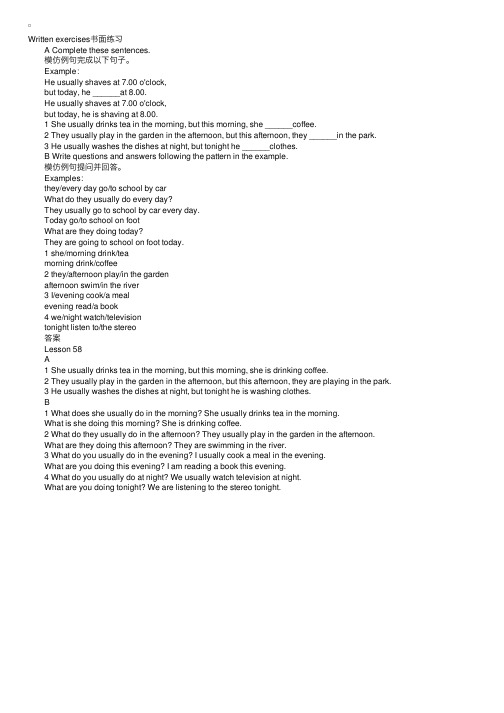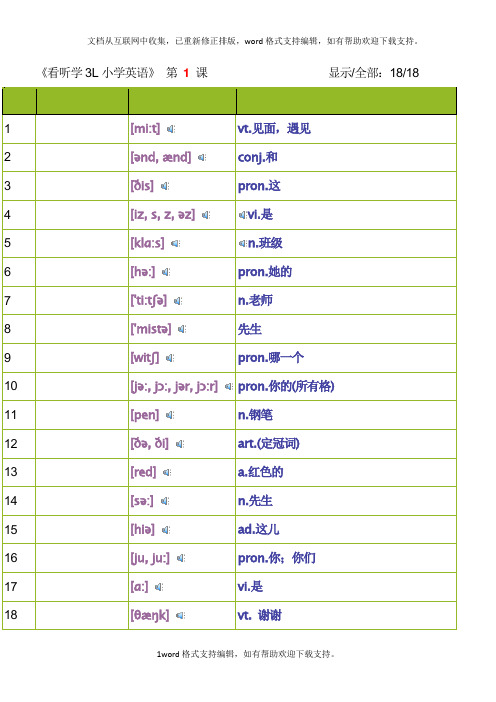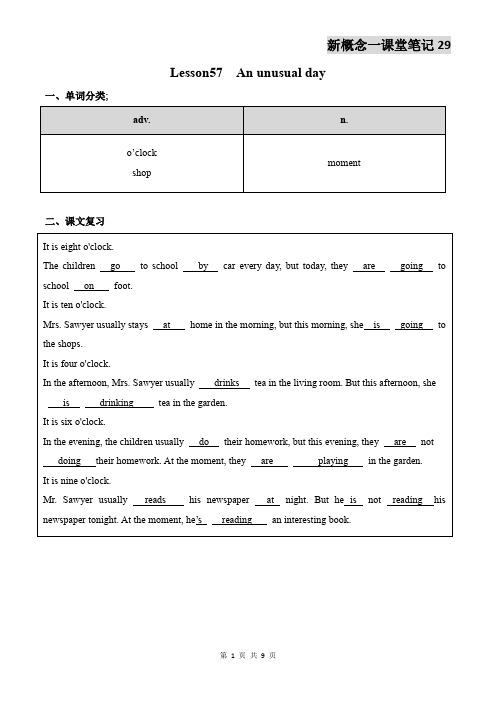看听学第一册Lesson57-58
新概念课堂笔记 第一册 Lesson 57-58

新概念英语课堂笔记第一册 Lesson 57-58【译文】不寻常的一天【用法】○1 unusual adj. 不寻常的 ,是由un + usual〔寻常的 ,平常的〕构成 ,其中-un是一个否认前缀 ,通常加在形容词前面 ,构成其反义词 ,比方:unhappy 不开心的 ,uneasy 不自在的 ,uncomfortable 不舒服的。
○2 unusual的首字母u发音为元音/ʌ / ,因此前面用不定冠词an。
○3形容词unusual用来修饰名词day ,作定语。
It is eight o’clock.【译文】现在是8点钟。
【用法】○1在英语中常用it来指时间、天气、温度或距离等。
这种it被称作“虚主语〞。
○2 o’clock adv. 点钟 ,放在基数词之后 ,表示“……点钟〞。
eight o’clock 八点钟 ,ten o’clock 十点钟。
The children go to school by car every day, but today, they are going to school on foot.【译文】孩子们每天都乘小汽车去上学 ,而今天 ,他们正步行去上学。
【用法】○1 by car和on foot 是固定搭配 ,分别表示“坐小汽车〞和“步行〞。
○2 by表示“乘坐〔某种交通工具〕〞 ,交通工具前不加冠词。
例如:by bus 乘公共汽车 by plane/by air 乘飞机by train 乘火车 by taxi 坐出租车by bike 骑自行车 by boat/ship 乘船○3句中的every day 作时间状语 ,强调经常、反复发生的动作 ,因此前半句为一般现在时。
today也是时间状语 ,表示今天此刻在发生的动作 ,所以后半句为现在进行时。
But this morning, she is going to the shops.【译文】但是今天上午 ,她正去商店买东西。
新概念英语第一册课后习题及答案:Lesson57-58

Written exercises书⾯练习 A Complete these sentences. 模仿例句完成以下句⼦。
Example: He usually shaves at 7.00 o'clock, but today, he ______at 8.00. He usually shaves at 7.00 o'clock, but today, he is shaving at 8.00. 1 She usually drinks tea in the morning, but this morning, she ______coffee. 2 They usually play in the garden in the afternoon, but this afternoon, they ______in the park. 3 He usually washes the dishes at night, but tonight he ______clothes. B Write questions and answers following the pattern in the example. 模仿例句提问并回答。
Examples: they/every day go/to school by car What do they usually do every day? They usually go to school by car every day. Today go/to school on foot What are they doing today? They are going to school on foot today. 1 she/morning drink/tea morning drink/coffee 2 they/afternoon play/in the garden afternoon swim/in the river 3 I/evening cook/a meal evening read/a book 4 we/night watch/television tonight listen to/the stereo 答案 Lesson 58 A 1 She usually drinks tea in the morning, but this morning, she is drinking coffee. 2 They usually play in the garden in the afternoon, but this afternoon, they are playing in the park. 3 He usually washes the dishes at night, but tonight he is washing clothes. B 1 What does she usually do in the morning? She usually drinks tea in the morning. What is she doing this morning? She is drinking coffee. 2 What do they usually do in the afternoon? They usually play in the garden in the afternoon. What are they doing this afternoon? They are swimming in the river. 3 What do you usually do in the evening? I usually cook a meal in the evening. What are you doing this evening? I am reading a book this evening. 4 What do you usually do at night? We usually watch television at night. What are you doing tonight? We are listening to the stereo tonight.。
新概念英语第一册 Lesson57~58-(共19张PPT)

② 逆读 即:先读分钟数,再读钟点数 • 情况一:当分钟数小于30 时,用“分钟数+past+钟点
数”,表示“…点过…分”; 分钟数刚好是半小时时, 可用“half past+钟点数”
如:5:30 half past five 8:10 ten past eight
• 情况二:当分钟数大于30时,用“分钟数(60减去已 知分钟数)+to+钟点数(已知钟点数+1)”,表示 “差…分到…点”。
想想看乘公 交车、火车、 飞机,怎么 说呢?
Grammar
1.钟点的表达法
(1) 整点时间:在钟点数后直接加o’ clock 即可,也可省略。
seven o’clock seven
?
2) 非整点时间: ① 顺读 即:先读钟点数,再读分钟数,数字直接读出
如: 8:30 eight thirty 10:45 ten forty-five
是 后来成 为古希 腊另一 位大哲 学家的 柏拉图 。这个 小故事 所蕴含 的深刻 含意是 显 而 易见的 。
“ 人 贵 有 志 ,人贵有 恒”,这 个道理 是千百 年来人 类在实 践总结 出来的。它深刻地阐 明 :人 最 可 贵 的是有 志向,最 难得 的是持 之以恒 。
你 可 能 羡 慕 那些成 功者吧 !但 你 知 道在他 们成功 的背后 付出了 多少汗 水吗?爱 迪生 说 “ 天 才 是 百分之 一的灵 感,加上 百分之 九十九 的汗水 。”不 要把精 力放在 羡慕别
试一试:
by ship
by plane 特例:步行 on foot
by bus by train
What time is it, Yoyo? It’s half past seven.(7:30)
看听学第一册Lesson57-58

9.knee 10.toe 11.pay 12.attention 13.pay attention ugh 15.matter
together
(3 )
pay attention
(7 )
line laugh jump
( 1)
(8 )
(2 )
toes matter knees touch
(6 )
3)祈使句的句首或句末常常加please,以缓和语气。 比如:Open the door please.请开门。
wash your 洗
hands face ears mouth
open the 打开
locker box letter packet
door shut the
desk gate refrigerator
Have a try 试一试 recite
Imperative Sentence
Teacher:Get into lines boys.Good.Now we can do some exercises. Teacher:Jump together!One,two,three,four,stop! Teacher:Touch your knees! Teacher:Touch your toes! Teacher:Pay attention,Tom.Don't laugh! Sandy:What's the matter,Tom? Tom:Silly Billy can't touch his toes.
Lesson 57&58 Silly Billy
line/lain/ 线,沿...排列p/dʒʌmp/ 跳
together/təɡɛðɚ/ 一起
lesson57-58

It’s twoIt’s It’s four It’s ten twelve o’clo _______. o’clock. o’clock. ck o’clock.
How does he usually go to school? He usually goes to school on foot.
How to tell the time?(1) 如何表达时间?
• What’s the time? • It’s about eight three. • It’s about three after eight.
• What time is it? • It’s nine five. • It’s five after nine.
They usually go to school on foot.
How do they go home?
They go home by car.
How does it go out?
It goes out by car.
What is he doing at the moment?
drink tea
It’s nineo’clock __________. Mr. Sawyer usually reads his newspaper __________________ at night. reading But he’s not ______ his tonight
newspaper ________,
How to tell the time?(2) 如何表达时间?
• Can you tell me the time? • It’s one thirty-five. • It’s twenty-five to two.
看听学3L小学英语第一册(1-60课)

《看听学3L小学英语》第1 课显示/全部:18/18[mi:t][ənd, ænd][ðis][iz, s, z, əz]vi.是[klɑ:s]n.班级[hə:]['ti:tʃə]['mistə][witʃ][jə:, jɔ:, jər, jɔ:r] pron.[pen][ðə, ði][red][sə:][hiə][ju, ju:][ɑ:][θæŋk]《看听学3L小学英语》(1) - 第2 课显示/全部:7/7[blu:] a.['pensl]n.[gri:n] a.[buk]n.[braun] a.[`sk u:lbæg]n.['rʌbə]n.《看听学3L小学英语》(1) - 第3 课显示/全部:11/11[hiz]pron.[mis]小姐[hu:z]pron.[kæp]n.[it]pron.[jes]ad.[kʌm]vi.[sit]vi.[daun]prep.[pli:z]ad.听学3L小学英语》(1) -第4 课显示/全部:1/1['ru:lə]n.《看听学3L小学英语》(1) -第5 课显示/全部:9/9[kik][bɔ:l][ɔ:l][rait][luk][əu]['sɔri]《看听学3L小学英语》(1) -第6 课显示/全部:12/12 ['jeləu] a.['baisik(ə)l]n.['penslbɔks]n.['bɑ:skit]n.[desk]n.[wait] a.白的 a.[ʌm'brelə]n.[kɑ:]n.[grei] a.['teibəl]n.[blæk] a.[tʃeə]n.《看听学3L小学英语》(1) - 第7 课显示/全部:10/10[hu:]pron.[ðæt]pron.[gə:l]n.[ɔn]prep.[in]prep.[bɔi]n.[wið, wiθ]prep.['futbɔ:l]n.[hi:]pron.['brʌðə]n.《看听学3L小学英语》(1) - 第8 课显示/全部:3/3['wumən]n.[mæn]n.[sistə]n.《看听学3L小学英语》(1) -第9 课显示/全部:11/11 [hʌ'ləu]int.[mʌm]n.[ti:]n.['redi] a.['hʌŋgri] a.[m, əm, æm]vi.[nəu]ad.[nɔt]ad.[wɔt, wɑ:t]pron.[nau]ad.['veri]ad.《看听学3L小学英语》(1) - 第10 课显示/全部:5/5['θə:sti] ['bizi] ['taiəd] [hɔt] [kəuld]《看听学3L小学英语》(1) - 第11 课显示/全部:4/4[mai]['piktʃə]['nais]《看听学3L小学英语》(1) - 第13 课显示/全部:13/13 [eg]['lisən][dæd][i:t]['kwikli][put][kʌp]['egkʌp][laik]['i:vniŋ]['tʃildrən]['empti]《看听学3L小学英语》(1) -第14 课显示/全部:4/4 ['æpəl]['ɔrindʒ]['aiskri:m][sku:l]《看听学3L小学英语》(1) - 第15 课显示/全部:10/10[hæt][ʃu:]['fʌni][tu:][mi:, mi][nɔk][dɔ:]['æktə]['æktris]《看听学3L小学英语》(1) - 第16 课显示/全部:8/8['sku:lbɔi]['sku:lgə:l]n.[pə'li:smən]n.[pə'li:s,wumən]n.['pəustmən]n.['milkmən]n.[dɔg]n.[kæt]n.《看听学3L小学英语》(1) - 第17 课显示/全部:6/6[fæt][nju:]['neim][him]['əupən][giv]《看听学3L小学英语》(1) - 第18 课显示/全部:9/9[θin] [tɔ:l] [ʃɔ:t] [jʌŋ] [əuld]['hændsəm]['bju:tifəl]['klevə]['leizi]《看听学3L小学英语》(1) - 第19 课显示/全部:10/10[bæg]n.['hevi] a.[si:]v.[siks]num.['eksəsaiz]n.[wʌn]num.[tu:]num.[θri:]num.[bə'nɑ:nə]n.《看听学3L小学英语》(1) - 第20 课显示/全部:7/7[big] a.[lait] a.[θik] a.[lɔŋ] a.[smɔ:l] a.[ful] a.[kʌp]n.《看听学3L小学英语》(1) - 第21 课显示/全部:5/5[ˌnæʃə'næliti][frentʃ]['dʒə:mən][said][pul]《看听学3L小学英语》(1) - 第22 课显示/全部:2/2['iŋgliʃ]n.a.[ə'merikən] a.《看听学3L小学英语》(1) - 第23 课显示/全部:3/3[i'tæliən] a.[bɔks]n.《看听学3L小学英语》(1) - 第25 课显示/全部:7/7[ðeə]ad.['letə]n.['mʌðə]n.['fɑ:ðə]n.[bil]n.《看听学3L小学英语》(1) - 第26 课显示/全部:2/2[ʃɔp]n.[stri:t]n.《看听学3L小学英语》(1) - 第27 课显示/全部:3/3[ði:z] a.这些['kʌlə]n.['lɔkə]n.小橱柜《看听学3L小学英语》(1) - 第29 课显示/全部:10/10[hænd]n. [kli:n] a.[ʃəu]vt.示[ðei]pron. ['də:ti] a. [gəu]vi. [wɔʃ]vt. [wʌns]ad. [ət 'wʌns]立即['tauəl]n.《看听学3L小学英语》(1) - 第31 课显示/全部:3/3[hedz]n.(的[teilz]n.(的['auə]pron.们的格《看听学3L小学英语》(1) -第32 课显示/全部:3/3[ðeə]pron.有格[its]pron.格[teil]n.《看听学3L小学英语》(1) - 第33 课显示/全部:10/10[trai][hau][tait]['priti]['leidi][dʒʌst][rait]《看听学3L小学英语》(1) -第34 课显示/全部:1/1《看听学3L小学英语》(1) - 第35 课显示/全部:2/2[stæmp][ðen]《看听学3L小学英语》(1) - 第37 课显示/全部:3/3['pju:pəl][ʃi:, ʃi]《看听学3L小学英语》(1) - 第39 课显示/全部:10/10['sænwidʒ, 'sændwitʃ]n.片[teik]vi.['hʌri]vi. [hei]int.['hɑ:d] a.《看听学3L小学英语》(1) - 第41 课显示/全部:10/10[bel][wi:][leit][taim][nain][ˌhed'mɑ:stə]['pleigraund][bəuθ]['klɑ:srum]《看听学3L小学英语》(1) - 第43 课显示/全部:13/13['kwaiət]['brekfəst][ˌʌp'steəz][pə'hæps][stil][ə'sli:p][weik][eit][ʃʌt][tə'dei]['hɔlidi]《看听学3L小学英语》(1) - 第44 课显示/全部:4/4['wimin][tʃaild][men]['æniməl]《看听学3L小学英语》(1) - 第45 课显示/全部:8/8[ʌs, əs] ['pækit] [swi:t][i:tʃ]['lɔlipɔp][in'sted]《看听学3L小学英语》(1) - 第46 课显示/全部:1/1['biskit]《看听学3L小学英语》(1) - 第47 课显示/全部:7/7[praiz]['tʃɔklit][kaunt][fɔ:][faiv][ʃeə]《看听学3L小学英语》(1) - 第49 课显示/全部:8/8[pəust][fain]['eni][sʌm]《看听学3L小学英语》(1) - 第50 课显示/全部:5/5[ʃelf]n.[wɔ:l]n.[trʌk]n.[geit]n.《看听学3L小学英语》(1) - 第51 课显示/全部:9/9[weə]ad.['əuvə]ad.[niə]prep.附近['ʌndə]prep. ['nju:sˌpeipə]n. ['pɔkit]n. [səu]ad. ['sili] a.《看听学3L小学英语》(1) - 第52 课显示/全部:2/2[dʒɑ:][dʒɑ:]n.大口瓶[haus][haus]n.房屋《看听学3L小学英语》(1) - 第53 课显示/全部:12/12[let][plei][haid][si:k][ten][kæn][bi'haind][fens][bi'said][tri:][ʌp]《看听学3L小学英语》(1) - 第54 课显示/全部:2/2[həum]《看听学3L小学英语》(1) - 第55 课显示/全部:7/7[həuld][kait][stænd][bi'twi:n][bə:d][hai]《看听学3L小学英语》(1) - 第56 课显示/全部:4/4[frʌnt]n.《看听学3L小学英语》(1) - 第57 课显示/全部:15/15[get]vi.[lain]n.[du, du:]vt.[dʒʌmp]vi.[tə'geðə]ad.[stɔp, stɑp]vi.[tʌtʃ]vt.[ni:]n.[təu]n.[pei]vt.vi.[ə'tenʃən]n.[lɑ:f]vi.['mætə]n.《看听学3L小学英语》(1) - 第58 课显示/全部:4/4[feis][iə][mauθ]['eərəplein]《看听学3L小学英语》(1) - 第59 课显示/全部:4/4[briŋ]vt.[kwik] a.[pɑ:s]vt.[gəul]n.《看听学3L小学英语》(1) - 第60 课显示/全部:10/10[kəut]n.[blauz]n. [dres]n. [ʃə:t]n. [pleit]n. [spu:n]n. [naif]n. [fɔ:k]n.。
新概念英语第一册第5758课内容介绍

新概念英语第一册第5758课内容介绍新概念英语第一册第57-58课内容介绍导语:日复一日,但不是每天都过得一样,每天发生的事还是有所不同的,下面是介绍不平常的一天的英语课文,欢送阅读。
It is eight o'clock. The children go to school by car every day, but today, they are going to school on foot.现在是8点钟。
孩子们每天都乘小汽车去上学,而今天,他们正步行上学。
It is ten o'clock. Mrs Sawyer usually stays at home in the morning, but this morning, she is going to the shops.现在是10点钟。
上午,索耶夫人通常是呆在家里的,但今天上午,她正去商店买东西。
It is four o’clock. In the afternoon, Mrs Sawyer usually drinks tea in the living-room, but this afternoon, she is drinking tea in the garden.现在是4点钟,下午,索耶夫人通常是在客厅里喝茶,但今天下午,她正在花园里喝茶。
It is six o’clock. In the evening, the children usually do their homework, but this evening, they are not doing their homework. At the moment, they are playing in the garden.现在是6点钟。
晚上,孩子们通常是做作业,而今天晚上,他们没做作业。
此刻,他们正在花园里玩。
It is nine o’clock, Mr. Sawyer usually reads his newspaper at night, but he is not reading his newspaper tonight. At the moment, he is reading an interesting book.现在是9点钟。
新概念英语第一册Lesson57-58笔记(语法点+配套练习+答案)

6.The boy reads books every day. (一现)
分钟数大于30分时,用to
1:35twenty-five to two
1:40twenty to two
1:45a quarter to two
1:50ten to two
1:55five to two
对时间提问用:what time
询问时间的特殊疑问句:
1.What time is it?2.What’s the time?
Lesson57 An unusual day
1、单词分类;
adv.
n.
o’clock
shop
moment
二、课文复习
三、课文重点
重点
例句
unusual adj.不寻常的
反义词:usual
构词法:
un- , =not
happy ---unhappy
lucky ---unlucky
adj. + ly =adv.
结构:主+be+动词ing
时间标志词:Look! Listen! now, at the moment, at present, this morning/week
My fatherreads a newspaperevery day.
否:My father doesn’t read a newspaper every day.
回家
stay in bed
呆在床上
by car
坐车
stay with sb.
- 1、下载文档前请自行甄别文档内容的完整性,平台不提供额外的编辑、内容补充、找答案等附加服务。
- 2、"仅部分预览"的文档,不可在线预览部分如存在完整性等问题,可反馈申请退款(可完整预览的文档不适用该条件!)。
- 3、如文档侵犯您的权益,请联系客服反馈,我们会尽快为您处理(人工客服工作时间:9:00-18:30)。
( )3.____ up early tomorrow!
A. Getting B. Get
C. To get
D. Got
( )4. ________ in bed. It’s bad for your eyes. C Don’t to read D Not read
A Not to read B Don’t read
Lesson 57&58 Silly Billy
line/lain/ 线,沿...排列成行
Get into lines ! 排到队伍里去!
jump/dʒʌmp/ 跳
together/təɡɛðɚ/ 一起
touch/tʌtʃ/ 碰
stop/stɒp/ 停止 matter /'mæ tə/ 麻烦,事情, 毛病
Lesson 58 Do this!
祈使句:
1)表示命令、请求、叮嘱的句子叫做祈使句。它通常省略主语,
以动词原形直接开头。
比如:Come with me,please.请跟我过来! Open the window,please.请打开窗户!
2)祈使句变否定句是在句首加“Don't”
比如:Don't talk to me like that.别这样跟我说话。 Don't swim in the river.不要在河里游泳。
kite glasses
hold the拿 着,抓着
umbrella newspaper
Look at that 一看
看
bird building
tree bicycle
Listen tothat 听
car truck
bell earoplane
用括号内所给动词的适当形式填空。 1. It’s an important meeting. __________ (not, be )late.
( )1 .Her doctor said: “________ work so hard”
A Stop B Don’t
C Can’t
D No
( )2.________ when you cross the road. C Be careful D To be careful
A Do care
B Care
9.knee 10.toe 11.pay 12.attention 13.pay attention ugh 15.matter
together
(3 )
pay attention
(7 )
line laugh
( 1) ( 8 )
jump
(2 )
toes matter knees touch
3)祈使句的句首或句末常常加please,以缓和语气。 比如:Open the door please.请开门。
wash your 洗
hands face ears mouth
open the 打开
locker box letter packet
door shut the
desk gate
refrigerator
Please ___________ (read) aloud
__________ (do) your homework now, Sam.
____________(careful), the car is coming. ____________ (not, make) any noise! Your mother is sleeping.
Have a try 试一试 recite
Imperative Sentence
Teacher:Get into lines boys.Good.Now we can do some exercises.
Teacher:Jump together!One,two,three,four,stop! Teacher:Touch your knees! Teacher:Touch your toes! Teacher:Pay attention,Tom.Don't laugh! Sandy:What's the matter,Tom? Tom:Silly Billy can't touch his toes.
( 6 ) ( 9 ) ( 5)
(4 )
Teacher:Get into lines boys.Good.Now we can do some exercises.
Teacher:Jump together!One,two,three,four,stop! Teacher:Touch your knees! Teacher:Touch your toes! Teacher:Pay attention,Tom.Don't laugh! Sandy:What's the matter,Tom? Tom:Silly Billy can't touch his toes.
Laugh/la:f/大笑
attention /ə'ten∫ən / 注意,立正
pay attention
注意,集中注意力
knee/ni:/
膝盖
toes/təʊz/ 脚趾
face
ear
mouth
aeroቤተ መጻሕፍቲ ባይዱlane
[ˈeərəpleɪn]
1.get 2.line 3.get into lines 4.do 5.jump 6.together 7.stop 8.touch
